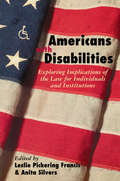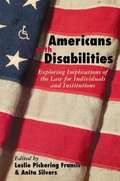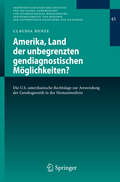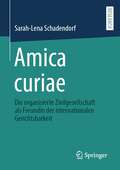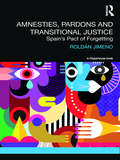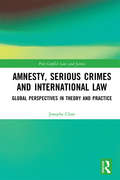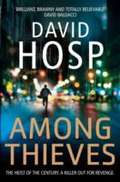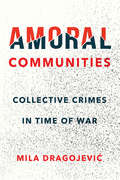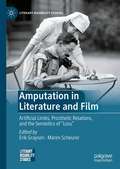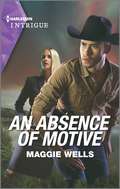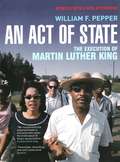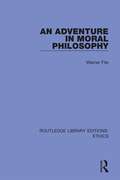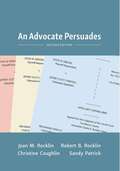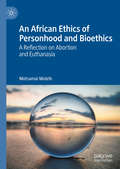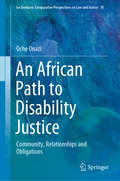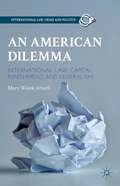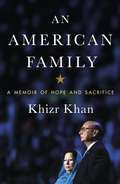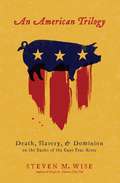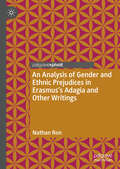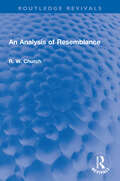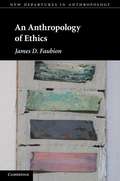- Table View
- List View
Americans at the Gate
by Carl J. Bon TempoUnlike the 1930s, when the United States tragically failed to open its doors to Europeans fleeing Nazism, the country admitted over three million refugees during the Cold War. This dramatic reversal gave rise to intense political and cultural battles, pitting refugee advocates against determined opponents who at times successfully slowed admissions. The first comprehensive historical exploration of American refugee affairs from the midcentury to the present, Americans at the Gate explores the reasons behind the remarkable changes to American refugee policy, laws, and programs. Carl Bon Tempo looks at the Hungarian, Cuban, and Indochinese refugee crises, and he examines major pieces of legislation, including the Refugee Relief Act and the 1980 Refugee Act. He argues that the American commitment to refugees in the post-1945 era occurred not just because of foreign policy imperatives during the Cold War, but also because of particular domestic developments within the United States such as the Red Scare, the Civil Rights Movement, the rise of the Right, and partisan electoral politics. Using a wide variety of sources and documents, Americans at the Gate considers policy and law developments in connection with the organization and administration of refugee programs.
Americans with Disabilities
by Anita Silvers Leslie FrancisIn this groundbreaking work, leading philosophers, legal theorists, bioethicists, and policy makers offer incisive looks into the philosophical and moral foundations of disability law and policy.
Americans with Disabilities: Exploring Implications of the Law for Individuals and Institutions
by Anita Silvers Leslie Pickering FrancisFew laws have sparked as much debate as the Americans with Disabilities Act (ADA), passed by Congress in 1990. With thought-provoking analysis by noted experts in a variety of fields, this book provides a keen understanding of the consequences of the law--for both those who oppose burdensome costs of the law and those who feel it must do more to protect citizens with disabilities from intolerance and social limitation.
Amerika, Land der unbegrenzten gendiagnostischen Möglichkeiten?: Die U.S.-amerikanische Rechtslage zur Anwendung der Gendiagnostik in der Humanmedizin (Veröffentlichungen des Instituts für Deutsches, Europäisches und Internationales Medizinrecht, Gesundheitsrecht und Bioethik der Universitäten Heidelberg und Mannheim #45)
by Claudia HenzeDas Buch gewährt einen umfassenden Überblick über den Status quo der U. S. -amerikanischen Rechtslage zu Humangentests, die in der Medizin zum Einsatz kommen. Die U. S. A. nehmen auf dem Gebiet der Humangenetik und in der Übertragung der erzielten Forschungsergebnisse in die medizinische Praxis international eine Spitzenposition ein. Ausdruck dieser überragenden Stellung der Vereinigten Staaten ist, dass die dort entwickelten Erbguttests und Verfahren weltweit genutzt werden. Dies gilt neben Verbrauchergentests von U. S. -Anbietern auch für klinische Gentests, die Mediziner außerhalb der U. S. A. bei ihren Patienten veranlassen und anschließend zur Auswertung an ein Labor des U. S. -Testherstellers schicken. Die Autorin untersucht im Hinblick auf diese internationale Dimension insbesondere, inwieweit die Qualitätssicherung humangendiagnostischer Tests, der Schutz vor genetischer Diskriminierung sowie die Vertraulichkeit genetischer Gesundheitsdaten in den Vereinigten Staaten gewährleistet sind.
Amica curiae: Die organisierte Zivilgesellschaft als Freundin der internationalen Gerichtsbarkeit
by Sarah-Lena SchadendorfDas prozessrechtliche Institut des amicus curiae („Freund des Gerichts“) hat insbesondere seit den 1990er Jahren eine Internationalisierung erfahren und Eingang in das Völkerverfahrensrecht gefunden. Dieses Buch legt eine umfassende empirische Bestandsaufnahme der amicus curiae-Praxis einer repräsentativen Auswahl internationaler Gerichte vor und greift die organisierte Zivilgesellschaft als prägende Akteurin heraus. Unter Berücksichtigung gerichtsspezifischer Besonderheiten umfasst die Bestandsaufnahme die Rechtsgrundlagen und Beweggründe sowie die bisherige Zulassungs- und Berücksichtigungspraxis und soll den theoretisch-konzeptionellen Debatten eine praktische Perspektive gegenüberstellen. Die anschließende gerichtsvergleichende Betrachtung veranschaulicht den vor internationalen Gerichten etablierten Verfahrensstandard, den Einfluss der Stellungnahmen zivilgesellschaftlicher Organisationen auf die Rechtsprechung der internationalen Gerichte sowie die Arten, Funktionen und Potentiale zivilgesellschaftlicher amici curiae in internationalen Gerichtsverfahren.
Amica's World: How a Giant Bird Came into Our Heart and Home
by Jane Goodall Meadow Shadowhawk Washo ShadowhawkAmica is a rhea-a flightless bird in the ratite family, related to ostriches, emus, and kiwis. Amica was adopted as a young chick and in turn quickly adopted mother and son Meadow and Washo Shadowhawk as his flock and made himself at home in their living room.Now an adult, Amica stands nearly six feet tall, and has a six-foot wingspan. By day he roams the backyard, exploring, running, and building nests, along with his friends the chickens and the dog. At night, he watches television and sleeps in the living room with his friend the cat.What's it like living with a rhea? As you'll discover in the words and photos in this book, it is never boring, and requires massive sacrifices. Rheas, which are typically hunted or raised as livestock, are highly intelligent and expressive, with a humanlike range of emotions. Amica's extraordinary story shows the powerful and surprising connections that can be forged between humans and animals.
Amish Grace: How Forgiveness Transcended Tragedy
by Steven M. Nolt Donald B Kraybill David L Weaver-Zercher&“This intelligent, compassionate and hopeful book&” examines an Amish community&’s extraordinary response to a horrifying act of violence (Publisher&’s Weekly, starred review). On October 2, 2006, a gunman named Charles Roberts entered a one-room Amish school in Nickel Mines, Pennsylvania. He took ten schoolgirls hostage, killing five and critically wounding the others before taking his own life. To explain his motivation, he told the children, &“I&’m angry at God for taking my little daughter.&” By the following morning, as television crews swarmed the village, the Amish parents were already prepared to offer forgiveness. Soon, this extraordinary act of grace became a bigger story than the terrible crime that preceded it. Amish Grace explores the religious beliefs and habits that led the Amish to forgive so quickly. The authors examines the importance of forgiveness among cloistered communal societies and ask why this act of forgiveness became news among secular society. With insight and compassion, the authors contemplate how the Amish community&’s witness could prove useful to the rest of us.
Amnesties, Pardons and Transitional Justice: Spain's Pact of Forgetting
by Roldan JimenoIn a consolidated democracy, amnesties and pardons do not sit well with equality and a separation of powers; however, these measures have proved useful in extreme circumstances, such as transitions from dictatorships to democracies, as has occurred in Greece, Portugal and Spain. Focusing on Spain, this book analyses the country's transition, from the antecedents from 1936 up to the present, within a comparative European context. The amnesties granted in Greece, Portugal and Spain saw the release of political prisoners, but in Spain amnesty was also granted to those responsible for the grave violations of human rights which had been committed for 40 years. The first two decades of the democracy saw copious normative measures that sought to equate the rights of all those who had benefitted from the amnesty and who had suffered or had been damaged by the civil war. But, beyond the material benefits that accompanied it, this amnesty led to a sort of wilful amnesia which forbade questioning the legacy of Francoism. In this respect, Spain offers a useful lesson insofar as support for a blanket amnesty – rather than the use of other solutions within a transitional justice framework, such as purges, mechanisms to bring the dictatorship to trial for crimes against humanity, or truth commissions – can be traced to a relative weakness of democracy, and a society characterised by the fear of a return to political violence. This lesson, moreover, is framed here against the background of the evolution of amnesties throughout the twentieth century, and in the context of international law. Crucially, then, this analysis of what is now a global reference point for comparative studies of amnesties, provides new insights into the complex relationship between democracy and the varying mechanisms of transitional justice.
Amnesty, Serious Crimes and International Law: Global Perspectives in Theory and Practice (Post-Conflict Law and Justice)
by Josepha CloseAmnesty, Serious Crimes and International Law examines the permissibility of amnesties for serious crimes in the contemporary international order. In the last few decades, there has been a growing tendency to consider that amnesties are prohibited in respect of certain grave crimes. However, the question remains controversial as there is no explicit treaty ban and general amnesties continue to be frequently issued in post-conflict and transitional contexts. The first part of the book explores the use of amnesties from antiquity to the present day. It reviews amnesty traditions in ancient societies and provides a global picture of modern amnesties. In parallel, it traces the development of the accountability paradigm underpinning the current prohibitive stance on amnesties. The second part assesses the position of modern international law on amnesties. It comprehensively analyses the main arguments supporting the existence of a general amnesty ban, including the duty to prosecute international crimes, the right to redress of victims of human rights violations, international standards and trends in state practice, and the mandate of international criminal courts. The book argues that, while international legal or policy requirements restrict the freedom of states to extend amnesty in respect of serious crimes, or the effectiveness of amnesty measures in preventing the prosecution of such crimes, these restrictions do not add up to an absolute and universal prohibition.
Among Thieves
by David HospOn the night of the St Patrick celebrations in 1990, some of the world's most famous and valuable paintings were stolen from Boston's Isabella Stewart Gardner Museum. They were never recovered, and there were no clues as to their whereabouts - that is until now. When Boston attorney Scott Finn takes on well-known thief, Devon Malley as a client, he gets much more than he bargained for. Not only is he asked to care for Devon's teenaged daughter, Sally, while Devon awaits bail, but his investigations into what he believed was a case of petty theft, lead him to the underworld of Boston's organized crime gangs, links with the IRA and the realization that he may be close to solving the mystery of the stolen paintings all those years ago. But an Irishman who, at nine years old, saw his entire family murdered before his eyes is determined to avenge their death. His commitment to the cause is frightening and unrelenting, and he will never give up until the job is finished
Amoral Communities: Collective Crimes in Time of War
by Mila DragojevićIn Amoral Communities, Mila Dragojević examines how conditions conducive to atrocities against civilians are created during wartime in some communities. She identifies the exclusion of moderates and the production of borders as the main processes. In these places, political and ethnic identities become linked and targeted violence against civilians becomes both tolerated and justified by the respective authorities as a necessary sacrifice for a greater political goal.Dragojević augments the literature on genocide and civil wars by demonstrating how violence can be used as a political strategy, and how communities, as well as individuals, remember episodes of violence against civilians. The communities on which she focuses are Croatia in the 1990s and Uganda and Guatemala in the 1980s. In each case Dragojević considers how people who have lived peacefully as neighbors for many years are suddenly transformed into enemies, yet intracommunal violence is not ubiquitous throughout the conflict zone; rather, it is specific to particular regions or villages within those zones. Reporting on the varying wartime experiences of individuals, she adds depth, emotion, and objectivity to the historical and socioeconomic conditions that shaped each conflict.Furthermore, as Amoral Communities describes, the exclusion of moderates and the production of borders limit individuals' freedom to express their views, work to prevent the possible defection of members of an in-group, and facilitate identification of individuals who are purportedly a threat. Even before mass killings begin, Dragojević finds, these and similar changes will have transformed particular villages or regions into amoral communities, places where the definition of crime changes and violence is justified as a form of self-defense by perpetrators.
Amputation in Literature and Film: Artificial Limbs, Prosthetic Relations, and the Semiotics of "Loss" (Literary Disability Studies)
by Maren Scheurer Erik GraysonAmputation in Literature and Film: Artificial Limbs, Prosthetic Relations, and the Semiotics of “Loss” explores the many ways in which literature and film have engaged with the subject of amputation. The scholars featured in this volume draw upon a wide variety of texts, both lesser-known and canonical, across historical periods and language traditions to interrogate the intersections of disability studies with social, political, cultural, and philosophical concerns. Whether focusing on ancient texts by Zhuangzi or Ovid, renaissance drama, folktales collected by the Brothers Grimm, novels or silent film, the chapters in this volume highlight the dialectics of “loss” and “gain” in narratives of amputation to encourage critical dialogue and forge an integrated, embodied understanding of experiences of impairment in which mind and body, metaphor and materiality, theory and politics are considered as interrelated and interacting aspects of disability and ability.
An Absence of Motive (A Raising the Bar Brief #1)
by Maggie WellsHe was an outsiderAnd the only man she could trust. Attorney Marlee Masters&’s brother was murdered. Proving it means working with Sheriff Ben Kinsella and facing down the nasty whispers in their rural Georgia town. Although the gossips accuse Marlee of being the real threat, there's a stalker vowing retribution if the two don&’t end the investigation. Ben won&’t abandon Marlee in her hour of need, but will she have to place herself in even more peril to catch the killer? From Harlequin Intrigue: Seek thrills. Solve crimes. Justice served. Discover more action-packed stories in the Raising the Bar Brief series. All books are stand-alone with uplifting endings but were published in the following order: Book 1: An Absence of MotiveBook 2: For the DefenseBook 3: Trial in the Backwoods
An Act of State: The Execution of Martin Luther King
by William F. PepperMartin Luther King Jr was a powerful and eloquent champion of the poor and oppressed in the US, and at the height of his fame in the mid-sixties seemed to offer the real possibility of a new and radical beginning for liberal politics in the USA. However,in 1968, he was assassinated; the movement for social and economic change has never recovered. The conviction of James Earl Ray for his murder has never looked even remotely safe, and when William Pepper began to investigate the case it was the start of a twenty-five year campaign for justice. At a civil trial in 1999, supported by the King family, seventy witnesses under oath set out the details of the conspiracy Pepper had unearthed: the jury took just one hour to find that Ray was not responsible for the assassination, that a wide-ranging conspiracy existed, and that government agents were involved. An Act of State lays out the extraordinary facts of the King story--of the huge groundswell of optimism engendered by his charismatic radicalism, of how plans for his execution were laid at the very heart of government and the military, of the disinformation and media cover-ups that followed every attempt to search out the truth. As shocking as it is tragic, An Act of State remains the most compelling and authoritative account of how King’s challenge to the US establishment led inexorably to his murder.
An Adventure In Moral Philosophy
by Warner FiteOriginally published in 1926, this book develops the Socratic thesis that morality is intelligence, that morality is not a matter of standards, laws and principles but in knowing what we do – in living self-consciously. The book develops this central theme in its bearings upon logic and science, art and religion and suggests that both intelligence and morality stand for much more than appears first obvious.
An Advocate Persuades
by Christine Coughlin Joan Rocklin Sandy Patrick Robert RocklinAn Advocate Persuades introduces its reader to the role of the advocate and the tools of persuasion. This book, like its predecessor A Lawyer Writes, places the reader in the role of a first-year attorney. Now, that first-year attorney must draft a motion or appellate brief and then present an oral argument. With step-by-step explanations and numerous examples, An Advocate Persuades explains how to develop and refine trial-level and appellate arguments and then how to present those arguments orally. Speaking to its readers in a straightforward manner, An Advocate Persuades communicates both the theories and foundational skills of persuasion so that they will be retained for a lifetime of legal practice.
An Advocate Persuades
by Christine Coughlin Joan Rocklin Sandy Patrick Robert RocklinThe second edition of An Advocate Persuades is reorganized into four parts: (1) Introduction to Advocacy; (2) Developing Arguments from a Persuasive Perspective; (3) Constructing Persuasive Court Documents (both at the trial and appellate level); and (4) Oral Argument (both at the trial and appellate level). The book also has an expanded appendix, which provides an overview of trial and appellate litigation in both civil and criminal cases, annotated trial and appellate briefs, and advice about moot court competitions.
An African Ethics of Personhood and Bioethics: A Reflection on Abortion and Euthanasia
by Motsamai MolefeThis book articulates an African conception of dignity in light of the salient axiological category of personhood in African cultures. The idea of personhood embodies a moral system for evaluating human lives exuding with virtue or ones that are morally excellent. This book argues that this idea of personhood embodies an under-explored conception of dignity, which accounts for it in terms of our capacity for the virtue of sympathy. It then proceeds to apply this personhood-based conception of dignity to bioethical questions, specifically, those of abortion and euthanasia. Regarding abortion, it concludes that it is impermissible since foetuses possess partial moral status. Regarding euthanasia, it argues that it is permissible for reasons revolving around avoiding the reversing of personhood. It also, though, minimally, touches on the questions regarding the mentally disabled and animals, to which it assigns lower moral status.
An African Path to Disability Justice: Community, Relationships and Obligations (Ius Gentium: Comparative Perspectives on Law and Justice #78)
by Oche OnaziHow should disability justice be conceptualised, not by orthodox human rights or capabilities approaches, but by a legal philosophy that mirrors an African relational community ideal? This book develops the first comprehensive answer to this question through the contemporary literature on African philosophy, which is relied upon to construct a legal philosophy of disability justice comprising of ethical ideals of community, human relationships and obligations. From these ideals, an African legal philosophy of disability justice is offered as a criterion for critically evaluating existing laws, legal and political institutions, as well as providing an ethical basis for creating new ones to ensure that they are inclusive to people with disabilities. In taking an alternative perspective on the subject, the book outlines and emphasises the need for a new public culture of obligations owed to people with disabilities, highlighting both the prospects and difficulties of achieving the ideal of disability justice that continues to elude the lived experiences of millions of Africans today. Oche Onazi's An African Path to Disability Justice is the first book-length exploration of disability in the light of African ethics, as contrasted with the human rights and capabilities frameworks. Of particular interest are Onazi's thoughtful reflections on how various conceptions of community salient in African moral philosophy––including group-based, reciprocal and relational––bear on what we owe to the disabled. --Thaddeus Metz, Distinguished Professor, University of Johannesburg
An American Dilemma
by Mary Welek AtwellAn American Dilemma examines the issue of capital punishment in the United States as it conflicts with the nation's obligations under the 1963 Vienna Convention on Consular Relations. In a number of high profile cases, foreign nationals have been executed after being denied their rights under the Vienna Convention. The International Court of Justice has ruled against the United States, but individual states have chosen to defy international law. The Supreme Court has not resolved the question of legal remedies for such breaches.
An American Family: A Memoir Of Hope And Sacrifice
by Khizr Khan'Khan's aspirational memoir reminds us all why Americans should welcome newcomers from all lands' Kirkus ReviewsIn fewer than three hundred words, Khizr Khan electrified viewers around the world when he took the stage at the 2016 Democratic National Convention. And when he offered to lend Donald Trump his own much-read and dog-eared pocket Constitution, his gesture perfectly encapsulated the feelings of millions. But who was that man, standing beside his wife, extolling the promises and virtues of the U.S. Constitution?In this urgent and timeless immigrant story, we learn that Khizr Khan has been many things. He was the oldest of ten children born to farmers in Pakistan, and a curious and thoughtful boy who listened rapt as his grandfather recited Rumi beneath the moonlight. He was a university student who read the Declaration of Independence and was awestruck by what might be possible in life. He was a hopeful suitor, trying to win the heart of a woman far out of his league. He was a brilliant and diligent young family man who worked two jobs to save enough money to put himself through Harvard Law School. He was a loving father who tragically lost his son, an Army captain killed while protecting his base camp in Iraq. He was and is a patriot, and a fierce advocate for the rights, dignities and values enshrined in the American system.An American Family shows us who Khizr Khan and millions of other American immigrants are, and why-especially in these tumultuous times-we must not be afraid to step forward for what we believe in when it matters most.
An American Trilogy
by Steven M. WiseThe Cape Fear River runs through Bladen County, North Carolina, population 33,000. On its western bank, in the town of Tar Heel, sits the largest slaughterhouse in the world. Deep below the slaughterhouse, one may find the arrowheads of Siouan-speaking peoples who roamed there for a millennium. Nearer the surface is evidence of slaves who labored there for a century. And now, the slaughterhouse kills the population of Bladen County, in hogs, every day.In this remarkable account, Wise traces the history of today's deadly harvest. From the colonies to the slave trade, from the artificial conception and unrecorded death of one single pig to the surreal science of the pork industry-whose workers continue the centuries of oppression-he unveils a portrait of this nation through the lives of its most vulnerable. His explorations ultimately lead to hope from a most unlikely source: the Baptist clergy, a voice in this wilderness proclaiming a new view of creation.
An Analysis of Gender and Ethnic Prejudices in Erasmus's Adagia and Other Writings
by Nathan RonThis book explores Erasmus's ethnic and gender prejudices. It does not in any way seek to undermine the esteem in which Erasmus is generally held, as a prince of the humanists; it is rather a consideration of common early modern prejudices. The book&’s principal innovation is the use of Erasmus&’s commentaries on thousands of Greek and Roman proverbs (his adagia) as a source for examining Erasmus&’s worldview. Researchers have often considered the adages as not voicing or reflecting Erasmus&’s views, and as such have chosen to ignore them. However, this book shows that Erasmus occasionally expresses his opinions through the adages, giving us an invaluable window into his worldview. An Analysis of Gender and Ethnic Prejudices in Erasmus's Adagia and Other Writings is essential reading for all scholars and researchers of early modern philosophy and intellectual history especially those researching the thought of Erasmus.
An Analysis of Resemblance (Routledge Revivals)
by Ralph W. Church dec'dFirst published in 1952, An Analysis of Resemblance has two-fold aims. The opening chapters seek to present what it is not about. It is not concerned with any sense of resemblance in which that term is used by thinkers generally and widely called Hegelian Idealists. The several subsequent chapters of the work advance an analysis of four senses of resemblance. Two of these four senses would seem to be radical – in the etymological sense of the term. The other two senses are derivative. The concluding chapter advances some considerations as to the bearing of an analysis of resemblance on the matters of universals and taxonomy. Professor Church’s clearly stated ideas will arouse much discussion among students of philosophy. This book helps to round off his studies in this field and is a worthy successor to his earlier works.
An Anthropology of Ethics
by James D. FaubionThrough an ambitious and critical revision of Michel Foucault's investigation of ethics, James Faubion develops an original program of empirical inquiry into the ethical domain. From an anthropological perspective, Faubion argues that Foucault's specification of the analytical parameters of this domain is the most productive point of departure in conceptualizing its distinctive features. He further argues that Foucault's framework is in need of substantial revision to be of genuinely anthropological scope. In making this revision, Faubion illustrates his program with two extended case studies: one of a Portuguese marquis and the other of a dual subject made up of the author and a millenarian prophetess. The result is a conceptual apparatus that is able to accommodate ethical pluralism and yield an account of the limits of ethical variation, providing a novel resolution of the problem of relativism that has haunted anthropological inquiry into ethics since its inception.

